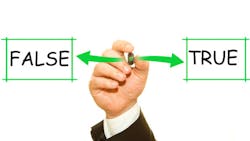“I Tremble for My Country.”
When Thomas Jefferson wrote those words in Notes on the State of Virginia in 1785, some sixteen years before he became the third president of the United States, he was addressing both the reality and the morality of slavery in his home state. And he was troubled.
Two hundred thirty-one years later, in this election year for the forty-fifth president of the United States, we might tremble for a community far larger than a single state, for a country of 50 states emotionally and philosophically divided by race, gender, faith, income, and fear, and seemingly disengaged from the nature of truth.
In our public and our private lives, in our businesses and in our governments, truths these days are less than self-evident. Accusation, innuendo, insinuation, and just plain lies seem to be the new truths. Indeed, too often in the economic, political, and social history of the United States during the past fifty years, new truths have proven to be extraordinary untruths, lies in search of facts that have not and never will exist. Untruths that hold people’s lives hostage. Untruths that can and do change what we think and how we think about the present. Untruths that have re-written lessons of history.
None of these has been for the better of humankind, for truth denied, dismissed, or deferred benefits no one—no individual, no organization, no nation.
This issue before us is not whether a truth is convenient or inconvenient. The issue is that truth must be just that—truth as best we know it. For it is truth that engenders trust. It is truth that passes understanding. It is truth that brings us together. It is truth from which enlightened principles are formed and practiced. And, ultimately, it is truth that makes us free.
The 2016 American presidential primary campaigns are completed. The general election for a new president of the United States will be completed in fewer than 100 days. And then all the issues, all the divisions, and all the disparaging remarks will go away. The truth is they will not. Nor must our concern about truth.
... if we fail to challenge our thinking periodically, we in the United States risk demagogues of the right and the left exceeding the demagogues of the past in both reach and grasp.."
The truth is that in all aspects of our lives, if we fail to ask questions continually and seek answers, if we fail to seek counsel outside ourselves and our circles of life, if we fail to challenge our thinking periodically, we in the United States risk demagogues of the right and the left exceeding the demagogues of the past in both reach and grasp.
And at that prospect, we should surely tremble for our country.
This is another in a series of occasional essays by John S. McClenahen, an award-winning writer who for four decades covered international economics, public policy, and management principles for IndustryWeek.
About the Author
John McClenahen
Former Senior Editor, IndustryWeek
John S. McClenahen, is an occasional essayist on the Web site of IndustryWeek, the executive management publication from which he retired in 2006. He began his journalism career as a broadcast journalist at Westinghouse Broadcasting’s KYW in Cleveland, Ohio. In May 1967, he joined Penton Media Inc. in Cleveland and in September 1967 was transferred to Washington, DC, the base from which for nearly 40 years he wrote primarily about national and international economics and politics, and corporate social responsibility.
McClenahen, a native of Ohio now residing in Maryland, is an award-winning writer and photographer. He is the author of three books of poetry, most recently An Unexpected Poet (2013), and several books of photographs, including Black, White, and Shades of Grey (2014). He also is the author of a children’s book, Henry at His Beach (2014).
His photograph “Provincetown: Fog Rising 2004” was selected for the Smithsonian Institution’s 2011 juried exhibition Artists at Work and displayed in the S. Dillon Ripley Center at the Smithsonian Institution in Washington, D.C., from June until October 2011. Five of his photographs are in the collection of St. Lawrence University and displayed on campus in Canton, New York.
John McClenahen’s essay “Incorporating America: Whitman in Context” was designated one of the five best works published in The Journal of Graduate Liberal Studies during the twelve-year editorship of R. Barry Leavis of Rollins College. John McClenahen’s several journalism prizes include the coveted Jesse H. Neal Award. He also is the author of the commemorative poem “Upon 50 Years,” celebrating the fiftieth anniversary of the founding of Wolfson College Cambridge, and appearing in “The Wolfson Review.”
John McClenahen received a B.A. (English with a minor in government) from St. Lawrence University, an M.A., (English) from Western Reserve University, and a Master of Arts in Liberal Studies from Georgetown University, where he also pursued doctoral studies. At St. Lawrence University, he was elected to academic honor societies in English and government and to Omicron Delta Kappa, the University’s highest undergraduate honor. John McClenahen was a participant in the 32nd Annual Wharton Seminars for Journalists at the Wharton School at the University of Pennsylvania in Philadelphia. During the Easter Term of the 1986 academic year, John McClenahen was the first American to hold a prestigious Press Fellowship at Wolfson College, Cambridge, in the United Kingdom.
John McClenahen has served on the Editorial Board of Confluence: The Journal of Graduate Liberal Studies and was co-founder and first editor of Liberal Studies at Georgetown. He has been a volunteer researcher on the William Steinway Diary Project at the Smithsonian Institution, Washington, D.C., and has been an assistant professorial lecturer at The George Washington University in Washington, D.C.
